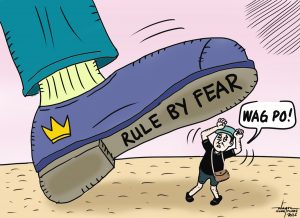Early evening of last Monday, March 16, 2020, President Rodrigo Duterte declared the entire Philippines under a state of national health emergency. Speaking on a national television the President said that he is constrained to do so, even with a heavy heart, and at the expense of the people’s freedom of movement, because the government sees that it is the only way to contain the spread of the deadly corona virus disease 2019 (COVID-19) that is now raging in almost 200 countries of the world.
The chief executive also expanded the coverage of the community quarantine from the Metro Manila area to the entire island of Luzon.
According to the President the health emergency is so wide-spread and the viruses transmit so fast wherever a carrier person is able to have contact with others who are prone to infection for one reason or another.
That was why, in explaining further the government’s action of declaring the country under a state of national health emergency, he said every Filipino is called upon to do his share in preventing the further spread of the disease. And that share is in terms of understanding the move adopted by the government and for each one to make sacrifices by obeying orders from the authorities in connection with the efforts to stop the pandemic.
Duterte also admitted during the Monday pronouncement that he is aware of the great risks of the crisis to the national economy and to the individual Filipino working man. Thus, he called upon the country’s large corporate conglomerates to help the small and medium scale businesses see through in these hard times.
He also pleaded to the business establishments to consider advancing the workers’ 13th month pay even on a pro-rata basis, or pay half of the salaries for days not being worked during the entire length of the emergency.
The President even offered some kind of a hand of peace with the oligarchs he has a running feud because of alleged abuse of government contracts to also help their employees while the health emergency still exists.
And he also sought the help of the New People’s Army (NPA) rebels by simply not doing offensive actions against soldiers and policemen who are at present doing duties related to the containment of the corona virus disease.
Of course as always, there are certain sectors of the population and the country’s political system who would not agree with what the administration is doing. These sectors, for political reason, would always make it appear that the government leaders are not doing enough for the people, or are doing the extreme measures that tantamount to curtailing the rights of the Filipinos.
We are also certain that these sectors of the population and political spectrum would be the most silent if the measures taken by the government succeed in curbing the epidemic. And they are the same groups who would be raising hell against the administration if the government is unable to arrest the health calamity.
But we agree that the first few days of the imposition of the state of national health emergency in the country could be kind of a rough and tumble situation. People would be making a lot of adjustments in their daily routines.
We could easily see that the most affected are those in the low income level of society as they are the first to be economically deprived with the loss of working days and consequently their daily wage. They are also the same sector that could not have the chance to compete with those who have the money in times of rush buying of basic household necessities like food.
Given this clear scenario as the emergency remains, we can only hope that barangay officials do their job as mandated by the President, to closely monitor the situation in their respective communities. They are to render situational reports at the grass roots level in order for the national government to provide the necessary assistance through the Department of Social Welfare and Development.
Indeed the present crisis that the Philippines is facing along with several other countries all over the world, including the most powerful United States of America, could be President Rodrigo Duterte’s most difficult test.
If he sees through this with the country still on its feet and the people surviving the economic hardship, Duterte’s administration would already be etched in stone in the history of the nation.

